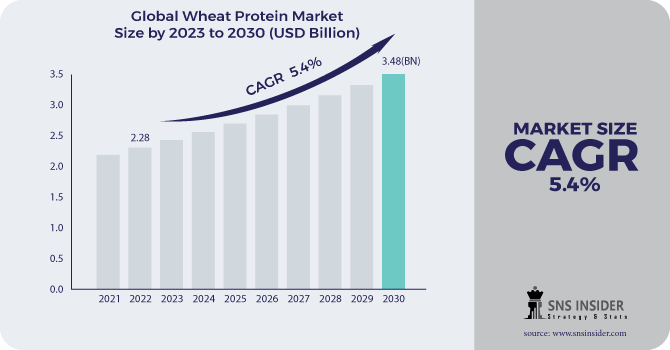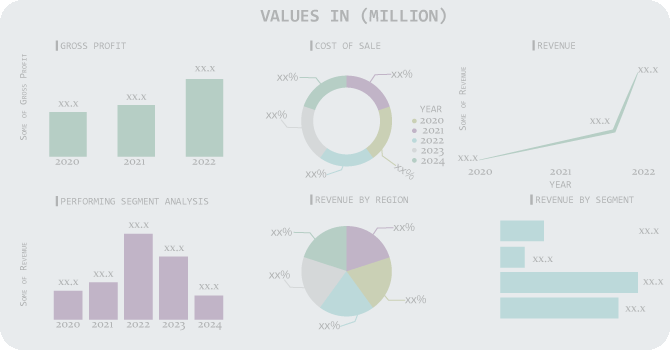Wheat Protein Market Report Scope & Overview:
The Wheat Protein Market Size was esteemed at USD 2.28 billion out of 2022 and is supposed to arrive at USD 3.48 billion by 2023, and develop at a CAGR of 5.4% over the forecast period 2023-2030.
Wheat-based food has been stapled nourishment for a long time and is a typical piece of diet around the world. Wheat contains 8-15% protein relying upon grain assortment. Wheat grains likewise contain gluten proteins. Gluten has an interesting actual utilitarian property that none of the other plant sources have. Gluten frames a strong, viscoelastic proteinaceous organization that gives the ability to the interest of wheat to deliver raised items. The significant wheat utilization has customarily been in heated items.

Get E-PDF Sample Report on Wheat Protein Market - Request Sample Report
Significant utilization of wheat in non-bread kitchen food sources is a meat substitution in vegan food sources. It is likewise utilized as a useful fixing in the food business because of its healthful advantages. Besides, wheat-based items are appropriate for individuals who are lactose prejudiced. Subsequently, the developing uses of wheat in food, refreshment, and nutraceutical plans drive the development of the wheat protein market.
A significant part of wheat protein is gluten which has an extraordinary interest in the pastry shop and ice cream parlor industry for making different food items. The protein supplements produced using wheat protein are popular these days for being veggie lover items. Wheat protein is an ideal swap for whey protein as it contains lactose which causes processing issues for the lactose prejudiced populace. Besides, wheat protein is likewise utilized for making creature feed and pet food which are exceptionally nutritious and engaging and are accessible at a sensible expense than other food.
Market Dynamics:
Driving Factors:
-
Dietary advantages for lactose narrow-minded and wellbeing and wellness cognizant buyers.
-
The developing veggie-lover populace.
Restraining Factors:
-
Expanding conversation on gluten narrow-mindedness and without gluten abstains from food.
Opportunities:
-
Developing potential for plant-based proteins because of expanded fondness for economical food sources.
-
The developing interest in pet food and creature feed.
Challenges:
-
Restricted mechanical turns of events.
Impact of COVID-19:
The coronavirus pandemic mixed affected the worldwide wheat protein market. The pandemic supported the interest for plant-based food attributable to its medical advantages. Thus, the interest in wheat protein likewise rose steeply. Nonetheless, then again, the market disturbances made by the Coronavirus pandemic prompted a diminish in deals. The pandemic likewise caused depictions in the production network which significantly impacted the worldwide market.
Market Estimations:
By Product:
As the result, the wheat gluten portion is projected to overwhelm the market during the figure time frame. The wheat protein market has been portioned into wheat gluten, wheat protein separate, finished wheat protein and hydrolyzed wheat protein. Wheat gluten overwhelmed the worldwide market, as far as both, worth and volume. A great many functionalities of wheat gluten like viscoelasticity, finishing, frothing, emulsification, and restricting prompt its wide-scale use in bread shop items. Its job as a superb meat elective for purchasers favoring veggie lover food items is supposed to drive its interest during the estimated time frame.
By application:
By application, the pet food portion is projected to be the quickest developing fragment in the market during the figure time frame. The developing consumption of pet food items alongside pet adaptation in economies, such for example, India and the US is supposed to drive the market development in the pet food supplements. Changing buyer inclinations driven by mindfulness toward meat obtaining rehearses, its biological effect, and creature-borne illnesses have prompted more purchasers to quit meat utilization. The subsequent change has prompted shoppers to request moving from traditional creature-based proteins to plant-based other options.
By Form:
By structure, the dry portion is projected to rule the market during the figure time frame. The dry type of handling of protein is utilized in the creation of wheat protein confines. It includes dry processing innovation, which is utilized to lessen the molecule size of unrefined substances into fine particles. This strategy is utilized to deal with wheat, which is related to its particular tissue design and processing conduct. The cycle depends on differential molecule size and thickness inside the processed flour. When processed, the air grouping process is utilized to isolate the more modest protein rice pieces from bigger starch-rich granules or fiber-rich granules.
Key Market Segmentation:
By Product Type:
-
Wheat gluten
-
Wheat protein isolate
-
Textured wheat protein
-
Hydrolyzed wheat protein
By Form:
-
Dry
-
Liquid
By Application:
-
Bakery & snacks
-
Pet food
-
Nutritional bars & drinks
-
Processed meat
-
Meat analogs
-
Others (dairy products, cosmetics, pasta, and noodles)
.png)
Get Customized Report as per your Business Requirement - Request For Customized Report
Regional Analysis:
-
North America
-
USA
-
Canada
-
Mexico
-
-
Europe
-
Germany
-
UK
-
France
-
Italy
-
Spain
-
The Netherlands
-
Rest of Europe
-
-
Asia-Pacific
-
Japan
-
south Korea
-
China
-
India
-
Australia
-
Rest of Asia-Pacific
-
-
The Middle East & Africa
-
Israel
-
UAE
-
South Africa
-
Rest of Middle East & Africa
-
-
Latin America
-
Brazil
-
Argentina
-
Rest of Latin America
-
North American market holds a significant piece of the pie in the wheat protein market, attributable to the bustling way of life and furious plan for getting work done generally in the United States and Canada is helping the utilization of RTE food items supporting local development. The Europe market is expected to notice a developing CAGR during the gauge time frame. Extending item utilization in rolls, cakes, bread, and other pastry kitchen items is actuating the wheat protein market. Flooding interest for plant-based food items attributable to nourishing advantages fueling the market development. Germany France and UK are key nations contributing significant income share inferable from the better reception of natural items invigorating industry size.
Key Players:
Archer Daniels Midland Company, Cargill, Incorporated., Crespel & Deiters, Roquette Frères, CropEnergies AG, Manildra Group, Kroener Staerke.
Roquette Frères-Company Financial Analysis

| Report Attributes | Details |
|---|---|
| Market Size in 2022 | US$ 2.28 Billion |
| Market Size by 2030 | US$ 3.48 Billion |
| CAGR | CAGR of 5.4% From 2023 to 2030 |
| Base Year | 2022 |
| Forecast Period | 2023-2030 |
| Historical Data | 2019-2021 |
| Report Scope & Coverage | Market Size, Segments Analysis, Competitive Landscape, Regional Analysis, DROC & SWOT Analysis, Forecast Outlook |
| Key Segments | • By Product (Wheat Gluten, Wheat Protein Isolate, Textured Wheat Protein, Hydrolyzed Wheat Protein) • By Application (Bakery, Pet Food, Nutritional Bars, Processed Meat, Meat Analogs) • By Form (Dry, Liquid) |
| Regional Analysis/Coverage | North America (USA, Canada, Mexico), Europe (Germany, UK, France, Italy, Spain, Netherlands, Rest of Europe), Asia-Pacific (Japan, South Korea, China, India, Australia, Rest of Asia-Pacific), The Middle East & Africa (Israel, UAE, South Africa, Rest of Middle East & Africa), Latin America (Brazil, Argentina, Rest of Latin America) |
| Company Profiles | Archer Daniels Midland Company, Cargill, Incorporated., Crespel & Deiters, Roquette Frères, CropEnergies AG, Manildra Group, Kroener Staerke |
| Key Drivers | • Dietary advantages for lactose narrow-minded and wellbeing and wellness cognizant buyers. • The developing veggie-lover populace. |
| Restraints | • Expanding conversation on gluten narrow-mindedness and without gluten abstains from food. |

